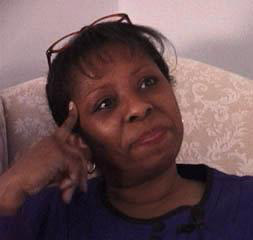“Steelton has gotten a lot better over the years and I think it’s something that someone said earlier to me, that you really have to make a difference in your own world, you know? And that’s why I am so avid about getting this history and salvaging the history that we have because we have so much to contribute. And I am not talking about just blacks, you know. It’s the Spaniards that are here and the Portuguese that are here. The American Indian, the Jews, you know, the Germans, the Croatians, the Slavs, you know all of them have so much wonderful history that, in this melting pot that we call Steelton and surrounding area, you know. If we could just all step up to the plate and out all that history out there, it would really make a difference in people’s lives.” – Barbara Barksdale, March 3, 2001
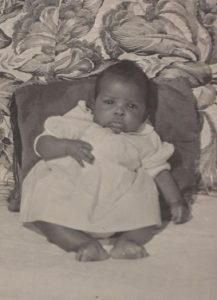 Barbara Barksdale was born on June 17, 1952 in Steelton, Pennsylvania to Willy and Desiree Estelle Murray Thomas. When they brought Barbara home, her two older sisters, Eleanor and Shirley, and older bother David, were awaiting her arrival. Originally, her mother, Desiree, was from Fairfax County, Virginia and came to Steelton in the early 1920s. Her father, Willy, came to Steelton in the mid 1940s from Putman County, Georgia so he and his family could find work in the steel mill.
Barbara Barksdale was born on June 17, 1952 in Steelton, Pennsylvania to Willy and Desiree Estelle Murray Thomas. When they brought Barbara home, her two older sisters, Eleanor and Shirley, and older bother David, were awaiting her arrival. Originally, her mother, Desiree, was from Fairfax County, Virginia and came to Steelton in the early 1920s. Her father, Willy, came to Steelton in the mid 1940s from Putman County, Georgia so he and his family could find work in the steel mill.
Church always played a very important role in her mother’s life, and it played an equally important role in Barksdale’s life, beginning in childhood. Barbara was baptized at the Mt. Zion Baptist Church on Locust Street in Steelton, and attended Bible Training Unit in addition to church on Sundays and Wednesday nights. The church was the center of the family’s social activities and it was a place where the community congregated. As an adult, she left Mt. Zion and began attending Beulah Baptist Church as an active member where her sister plays the piano and her brother is an assistant minister.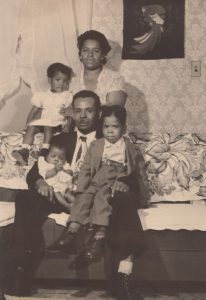
When it was time to attend school, Barksdale was in the first class to attend the newly integrated Steelton Elementary School. She later attended Steelton-Highspire High School where she challenged the school’s curriculum. During her freshman year, she organized a “sit-in” with other students, demanding the inclusion of black history in the school. She recalled this experience during a recent interview.
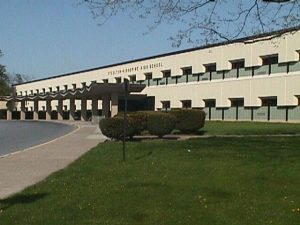
2001 – The front entrance to the current high school building
“As far as me being militant and everything…why wasn’t I being taught the same way as whites, even in the classroom? Why couldn’t I have my black history in schools? You know, we didn’t have black history. They wasn’t getting any of the black girls on the cheerleading teams or anything. You always had the black boys, but soon as the boys were done with their sports, they were done for. My militance came out in ninth grade when I created what they called a riot. I organized all the students and we had a little sit-in…”
Barksdale was expelled for a day for being the “ringleader” of her sit-in, and recalls walking “along home all proud with my chest all out. My momma slapped me as soon as I got in the door.” But, due to her advocacy, and the help of many others, she can now say, “Well, you know, we got black history now.” She went on to graduate high school in 1971.
After graduating from high school, Barksdale decided to go to nursing school. In a past interview, she discussed how she made the decision to do so. 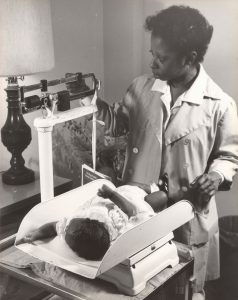
“I think it’s one of those things that’s, you know, how when you are raised in an environment of people that may be sick. It’s like you’re a victim of your environment. My mother was always sick. She had diabetes and I always had a tendency to be at the hospital hanging out, and say, oh well, maybe that’s what I should do.”
In school, she received enough credits to be eligible to teach nursing. For about four years, she taught Anatomy and Physiology at the Academy of Medical Arts and Business in Harrisburg.
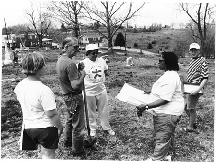 Barbara’s passion for understanding and revealing the contributions of African Americans to US history did not end in ninth grade. As an adult, Barbara has been very involved in restoring the Midland Cemetery in Steelton, an African American cemetery that dates back to the Civil War. Several years ago, she came across the cemetery while searching for her grandfather’s grave. The cemetery is known for being the resting place for many African Americans of Steelton. She recalled the condition of the cemetery as being “appalling.” People can’t even drive past it and acknowledge that people are buried there because of the weeds and trees.” Barksdale therefore took an active role in restoring the site and became the president of The Friends of the Midland Cemetery. As she became more involved in the project, she discovered that her step grandfather, great great grandmother, and many aunts and uncles were buried there as well. For Barksdale, the cemetery is a huge step in continuing her militancy from childhood and fighting for black history to be acknowledged.
Barbara’s passion for understanding and revealing the contributions of African Americans to US history did not end in ninth grade. As an adult, Barbara has been very involved in restoring the Midland Cemetery in Steelton, an African American cemetery that dates back to the Civil War. Several years ago, she came across the cemetery while searching for her grandfather’s grave. The cemetery is known for being the resting place for many African Americans of Steelton. She recalled the condition of the cemetery as being “appalling.” People can’t even drive past it and acknowledge that people are buried there because of the weeds and trees.” Barksdale therefore took an active role in restoring the site and became the president of The Friends of the Midland Cemetery. As she became more involved in the project, she discovered that her step grandfather, great great grandmother, and many aunts and uncles were buried there as well. For Barksdale, the cemetery is a huge step in continuing her militancy from childhood and fighting for black history to be acknowledged.
“I’m finally getting to go back [in the schools] and talk about black history and the contributions of the people that are laid in Midland Cemetery. And people didn’t know that in our own area, here we have Buffalo Soldiers who are the United States Colored Troops that.fought in the war to get our own freedom. That, you know, we had Civil Right’s movers and shakers right here in Steelton, so, that’s what I am fighting for.”
Barksdale lives her life in order to contribute to the community and to leave good things in her path. When she passes away, she hopes to be remembered for the contributions that she has made. 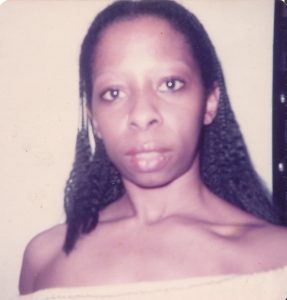
“…If it’s being that little militant person, starting that black history, cleaning up Midland, educating people, involving students…in my life that’s going to hopefully pass on the word that will inspire educators, doctors, lawyers, nurses…then let it be.”
She has certainly left her mark on Steelton and all the Mosaic students. We know her influence will continue to touch others. She has achieved great things and has taken advantage of the opportunity to make a difference.
“…Hopefully my dash is going to contribute to this world, and it will me more than a plaque on my wall or commendations for this or that or an award for that. It will be the people who remember that I was apart of their lives in some form or fashion. It’s going to be nice…we’ll party…it’s going to be nice…in about ninety years.”
Barbara Barksdale currently lives in Steelton, continues to educate others about African American history, and is lovingly restoring the Midland Cemetery.
Return to Reflections of the Past – Then
